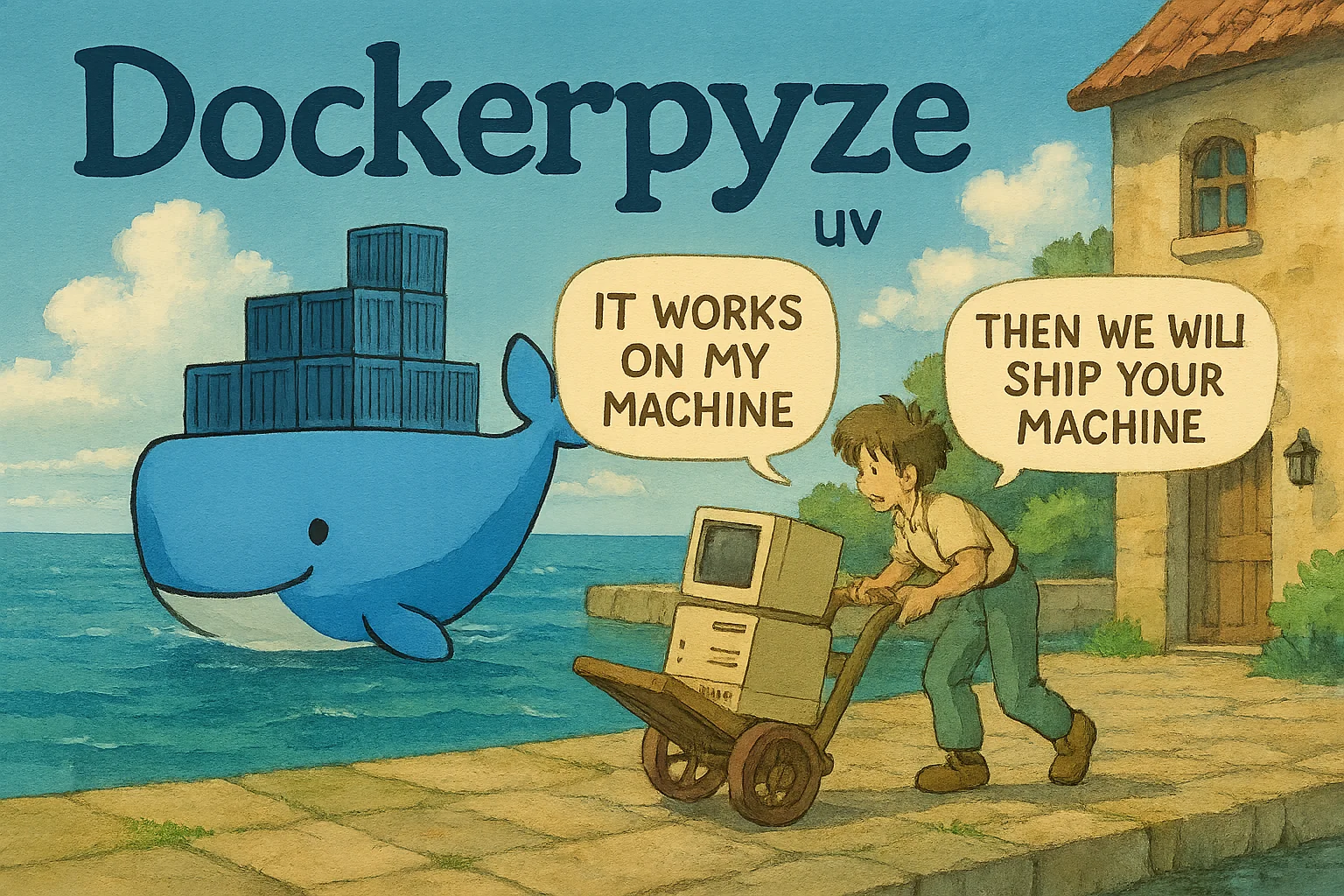Previously named poetry-dockerize-plugin
Key features:
- Automatically generate a docker image from your
uv/poetryapplication. - PEP-621 compliant.
- 100% configurable. You can configure the image by adding a section in the
pyproject.tomlconfiguration file.
- Install it as a dev dependency:
uv add dockerpyze --dev
- Configure entrypoint in
pyproject.toml:
[tool.dpy]
entrypoint = "uv run <your-script>"- Now straight to the point:
uv run dockerpyze
>No .dockerignore found, using a good default one 😉
>Building image: dockerpyze:latest 🔨
Successfully built images: ✅ (0.3s)
- dockerpyze:latest- Tell your friends about this library 😉
- Move your project to
uv... well if you can't do it, you can still usepoetry. - Install the freaking plugin:
poetry self add dockerpyze@latest
- Configure entrypoint in
pyproject.toml:
[tool.dpy]
entrypoint = "poetry run <your-script>"- Now straight to the point:
poetry dockerpyze
>No .dockerignore found, using a good default one 😉
>Building image: dockerpyze:latest 🔨
Successfully built images: ✅ (0.3s)
- dockerpyze:latest- Tell your friends about this library 😉 (and then switch to
uv)
To customize some options, you can add a [tool.dpy] section in your pyproject.toml file. For example to change the image name:
[tool.dpy]
name = "myself/myproject-app"You can also pass any option via environment variable by prefixing the key with DPY_. For example, to set the entrypoint you can use the DPY_ENTRYPOINT environment variable:
export DPY_ENTRYPOINT="python -m myapp"
uv run dockerpyzeor use a .env file which will be loaded by the plugin:
echo "DPY_ENTRYPOINT=python -m myapp" > .env
poetry dockerpyze
For dicts such as env and labels, you can set multiple values by adding multiple variables:
export DPY_ENV_MY_VAR="my_value"
export DPY_ENV_MY_OTHER_VAR="my_other_value"
export DPY_LABELS_MY_LABEL="label1"
poetry dockerpyzeYou just need to run the quickstart command in your GitHub Actions workflow:
name: Build and publish latest
on:
push:
branches: main
jobs:
login:
runs-on: ubuntu-latest
steps:
- name: Check out the repo
uses: actions/checkout@v3
- name: "Setup: Python 3.11"
uses: actions/setup-python@v4
- name: Install uv
run: python -m pip install uv
- name: Build and package
run: |
uv sync
uv run ruff
uv run pytest
uv run dockerpyze
- name: Login to Docker Hub
uses: docker/login-action@v3
with:
username: ${{ secrets.DOCKERHUB_USERNAME }}
password: ${{ secrets.DOCKERHUB_TOKEN }}
- name: Push to Docker Hub
run: docker push my-app:latestThis examples shows a complete configuration of the docker image:
[tool.dpy]
name = "alternative-image-name"
python = "3.12"
base-image = "python:3.12-slim"
tags = ["latest-dev"]
entrypoint = ["python", "-m", "whatever"]
ports = [5000]
env = {"MY_APP_ENV" = "dev"}
labels = {"MY_APP_LABEL" = "dev"}
apt-packages = ["curl"]
extra-run-instructions = ["RUN curl https://huggingface.co/transformers/"]
# Only for build docker layer
build-apt-packages = ["gcc"]
extra-build-instructions = ["RUN poetry config http-basic.foo <username> <password>"]
build-poetry-install-args = ["-E", "all", "--no-root"]
namecustomizes the docker image name.pythonpython version to use. If not specified, will try to be extracted fromtool.poetry.dependencies.python. Default is3.11base-imagecustomizes the base image. If not defined, the default base image ispython:<python-version>-slim-bookworm.tagsdeclares a list of tags for the image.entrypointcustomizes the entrypoint of the image. If not provided, the default entrypoint is retrieved from thepackagesconfiguration.portsexposes portsenvdeclares environment variables inside the docker image.labelsappend labels to the docker image. Default labels are added following the opencontainers specification.apt-packagesinstalls apt packages inside the docker image.extra-run-instructionsadds extra instructions to the docker run (after poetry install). Any modification to the filesystem will be kept after the poetry install.
For the build step:
build-apt-packagesinstalls apt packages inside the build docker container.extra-build-instructionsadds extra instructions to the docker build (before poetry install). Any modification to the filesystem will be lost after the poetry install. If you need to add files to the image, use theextra-run-instructions.build-poetry-install-argsadds additional arguments to thepoetry installcommand in the build step.
All command line options provided by the dockerpyze may be accessed by typing:
uv run dockerpyze --help
poetry dockerpyze --helpTo troubleshoot the plugin, you can use the --debug flag to get more information about the execution.
poetry dockerpyze --debugThe build is broken and --debug is completely useless? I get it.
You can generate the Dockerfile and manually build it to have more control over the problem.
uv run dockerpyze --generate
docker build Dockerfile .
It's totally fine to use the
--generateflag to generate the initialDockerfileand then customize it. I don't mind.
This project is licensed under the terms of the MIT license.
- Open an issue
- (optional) Open a pull request and I'll merge it, maybe.



